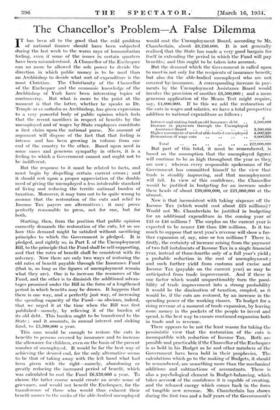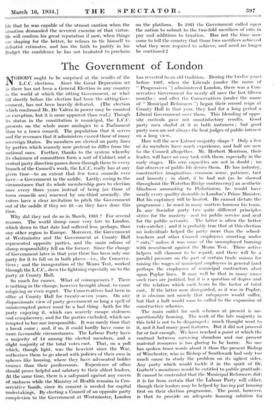The Chancellor's Problem —A False Dilemma
IT has been all to the good that the cold problem of national finance should have been subjected during the last week to the warm rays of humanitarian feeling, even if some of the issues in certain quarters have been misunderstood. A Chancellor of the Exchequer can no more be allowed the sole power to decide the direction in which public money is to be used than an Archbishop to decide what sort of. expenditure is the most Christian. The Christianity of the Chancellor of the Exchequer and the economic knowledge of the Archbishop of York have been interesting topics of controversy. But what is more to the point at the moment is that the latter, whether he speaks as Dr. Temple or ex cathedra as Archbishop, has given expression to a very powerful body of public opinion which feels that the recent sacrifices in respect of benefits by the unemployed and of wages by.State employees constitute a first claim upon the national purse. No amount of argument will dispose of the fact that that feeling is intense and has been growing in volume from one end of the country to the other. Based upon need in some cases and generous sympathy in others, it is a feeling to which a Government cannot and ought not to be indifferent.
But the response to it must be related to facts, and must begin by dispelling certain current errors ; and it should rest upon a proper appreciation of the double need of giving the unemployed a less intolerable standard of living and reducing the terrific national burden of taxation. Moreover, it may turn out to be quite wrong to assume that the restoration of the cuts and relief to Income Tax payers are alternatives ; it may prove perfectly reasonable to press, not for one, but for both.
Starting, then, from the position that public opinion earnestly demands the restoration of the cuts, let us see how this demand might be satisfied without sacrificing principles to which the Government is pledged. It is pledged, and rightly so, in Part L of the Unemployment Bill, to the principle that the Fund shall be self-supporting, and that the rates of benefit shall be consistent with its solvency. Nov there are only two ways of restoring the old rates of benefit payable through the Insurance Fund (that is, so long as the figures of unemployment remain what they are). One is to increase the resources of the Fund, and the other is to diminish the additional advan- tages promised under the Bill in the form of a lengthened period in which benefits may be drawn. It happens that there is one way, and a perfectly just way, of increasing the spending capacity of the Fund—so obvious, indeed, that we urged it at the time when the Bill was first published—namely, by relieving it of the burden of its old debt. This burden ought to be transferred to the State ; and it amounts, in annual interest and sinking fund, to £5,500,000 a year.
This sum would be enough to restore the cuts in benefits to persons covered by insurance and to increase the allowance for children, even on the basis of the present number of unemployed. It would be far the best way of achieving the desired end, foi the only, alternative seems to- be that of taking away. with the left hand what had been given with the right—namely, abandoning or greatly reducing the increased period of benefit, which was calculated to cost the Fund 28,850,000 a year. To choose the latter course would create an acute sense of grievance, and would not benefit the Exchequer, for the transference of those who would thus exhaust their benefit sooner to the ranks of the able-bodied' unemployed would cost the Unemployment Board, according to Mr. Chamberlain, about £6,250,000. It is not generally realized that the State has made a very good bargain for itself in extending the period in which the Fund will pay benefits ; and this ought to be taken into account.
But the demand which the Government is called upon to meetqs;not only for the recipients of insurance benefit; but alsoAfor the able-bodied unemployed who arc not covered:bp-insurance. A corresponding .increase in pay- ments by the Unemployment Assistance Board would involve the provision of another 13,500,000 ; and a more generous application of the Means Test might require,' say, 14,000,000. If to this we add the restoration of the cuts in wages and salaries, we have a total prospective addition to national expenditure as follows :
Interest and sinkingfunkon old Insurance debt .. 5,500,000 Increase in payments through the Unemployed Assistance:‘Reard . 3,500000 Higher as.sessrhent of need of able-bodied unemployed 4,000,000 Restoration Orwage cuts .. 9,000$60 Total • • . • • • .. • . • . £22,000,000
But part of this, total, it must be remembered, is based on the assumption that the unemployed figures. will continue to be as high throughout the year as they are now ; whereas every responsible spokesman of the Government has committed himself to the view that trade is steadily improving, and that unemployment will fall. In view of this confidence, the Chancellor would be justified in budgeting for an increase under these heads of about £20,000,000, or £21,000,000 at the utmost.
Now is that inconsistent with taking sixpence off the Income Tax (which would cost about £25 millions) ? Would not Mr. Chamberlain be justified in budgeting for an additional expenditure in the coming year of i45 or £46 millions ? The surplus on the current year is expected to be nearer £40 than 130 millions. Is it too much to suppose that next year's revenue will show a fur- ther expansion of, say, nine or ten millions ? There is, firstly, the certainty of increase arising from the payment of two full instalments of Income Tax in a single financial year, instead of three-fourths only of a full year's yield ; a probable reduction in the cost of unemployment ; and such further yield from customs and excise and Income Tax (payable on the current year) as may be anticipated from trade improvement. And if there is one factor which would unquestionably turn the possi- bility of trade improvement into a strong probability it would be the diminution of taxation, coupled, as it would be, if the cuts are restored, by an increase in the spending power of the working classes. To budget for a rising revenue at a moment of trade expansion, by leaving more money in the pockets of the people to 'invest and spend, is the best way to ensure continued expansion both in trade and in revenue.
There appears to be not the least reason for taking the pessimistic view that .the restoration of the cuts is incompatible with reduction of Income Tax. Both are possible and practicable if the Chancellor of the ExcheqUer is as bold in his Budget as he and other meMbers of the Government have been bold in their prOPlieciei. The calculations which go to the making of Budgets, it should be remembered,- are something more than the-mechanical additions and subtractions of accountants. There is also a psychological element in Budget-balancing' , which takes account of the confidence it is capable of creating, and the released energy which comes back in the form of tangible new, revenue. Mr. Chamberlain has shown during the first two and a half years of the Government's life that he was capable of the utmost caution when the situation demanded the severest exercise of that virtue. He will confirm his great reputation if now, when things are shaping for the better, he refuses to tie himself to defeatist estimates, and has the faith to justify in his Budget the confidence he has not hesitated to proclaim on the platform. In 1981 the Government called upon the nation to submit to the two-fold sacrifices of cuts in pay and additions to taxation. Has not the time now come to tell the country that those two sacrifices achieved what they were required to achieve, and need no longer be continued ?











































 Previous page
Previous page